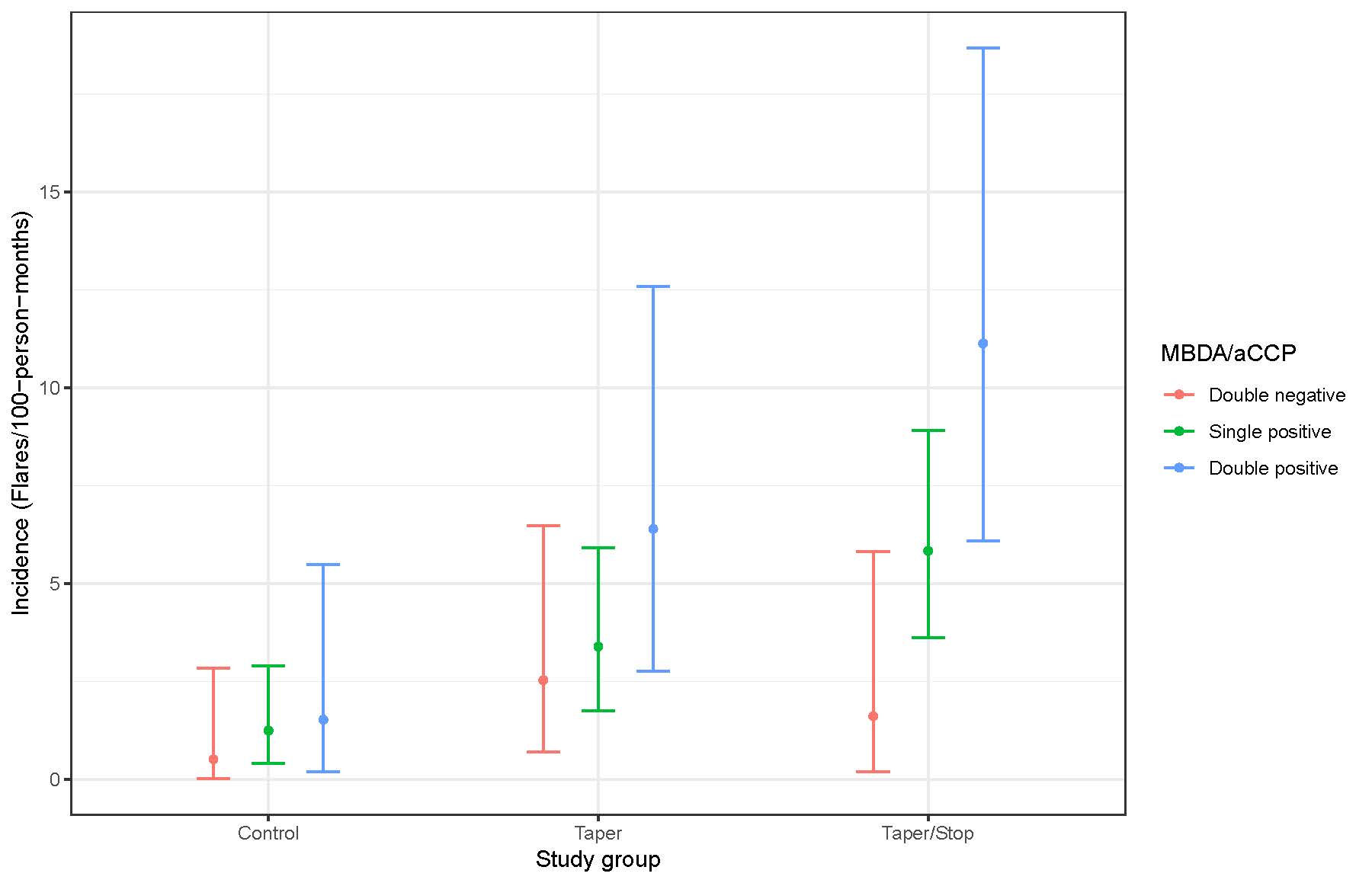Session Information
Session Type: Poster Session (Tuesday)
Session Time: 9:00AM-11:00AM
Background/Purpose: Achieving remission is the ultimate treatment goal in patients with rheumatoid arthritis (RA). With the development and wider use of highly effective disease modifying anti-rheumatic drugs (DMARD) about half of RA patients reach the disease remission state, raising the question about tapering or stopping anti-rheumatic treatment and appropriate predictors. The purpose was to analyze the effect of multi-biomarker disease activity (MBDA) score and anti-citrullinated protein (ACPA) on relapse rates in RA patients in sustained remission enrolled in the prospective randomized controlled RETRO study.
Methods: MBDA scores and ACPA status were determined in the baseline samples of patients in sustained DAS28-ESR remission fulfilling RETRO inclusion criteria. Patients were unblended and either continued DMARDs (Control), tapered dose by 50% (Taper) or stopped DMARDs after tapering (Taper/Stop) for one year according to the RETRO study protocol. MBDA and ACPA status were used as relapse predictors. Relapse was defined as the loss of a DAS28-ESR remission. We calculated incidence of flares and 95% Poisson confidence intervals by baseline ACPA and MBDA status in each study group (double negative, single positive, double positive). We compared the risk of flare in the treatment arms with a Cox regression model and calculated hazard ratios (HR) and 95% confidence interval (CI) for relapses.
Results: Serum samples and follow-up data of 203 patients included in the RETRO trial were analyzed. A flare was observed in 8/59 patients (13.6%) in the Control group, 24/60 (40.0%) patients in the Taper group and 37/68 (54.4%) patients in the Taper/Stop group among the 187 patients that completed their 1-year follow-up. HR (95%CI) for a relapse was 3.43 (1.54-7.66) in the taper group and 5.32 (2.47-11.46) for the control group. HR of flare of a positive MBDA and ACPA was 4.00 (1.72-9.31) compared to a negative MBDA and ACPA. Flare incidence did not differ with baseline MBDA/ACPA status in the control group, whereas in the taper/stop group, number of positive biomarkers could identify three distinct subgroups with a graded incidence of flare (Figure).
Conclusion: Tapering or stopping DMARDs after stable remission was associated with an increased risk of RA flares. Incidence of flares in MBDA/ACPA double-negative patients after tapering and stopping RA treatment was comparable to those that continued treatment within the precision limits of our subgroups.
To cite this abstract in AMA style:
Hagen M, Tascilar K, Reiser M, Haschka J, Kleyer A, Valor L, Manger B, Schett G, Rech J. Prediction of Disease Relapses by Multi-biomarker Disease Activity Score and Autoantibody Status in RA Patients Tapering DMARD Treatment in Stable Remission [abstract]. Arthritis Rheumatol. 2019; 71 (suppl 10). https://acrabstracts.org/abstract/prediction-of-disease-relapses-by-multi-biomarker-disease-activity-score-and-autoantibody-status-in-ra-patients-tapering-dmard-treatment-in-stable-remission/. Accessed .« Back to 2019 ACR/ARP Annual Meeting
ACR Meeting Abstracts - https://acrabstracts.org/abstract/prediction-of-disease-relapses-by-multi-biomarker-disease-activity-score-and-autoantibody-status-in-ra-patients-tapering-dmard-treatment-in-stable-remission/

